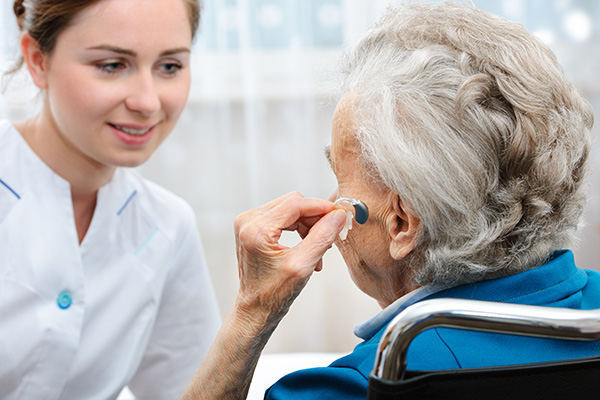
What are the health benefits of hearing aids?
It’s well known that untreated hearing loss is associated with several health dangers, including higher rates of dementia, falling and depression. Experts think a lot of the stems from the social isolation caused by hearing loss.
This isn’t a rare problem: Hearing steadily declines as we age. By 100, practically everyone has hearing loss.
The good news? Greater than a decade ago, research revealed that treating hearing loss via hearing aids or other devices like cochlear implants an improve overall standard of living. Since that time, a wealth of research has shown similar benefits. Let’s take a look:
Illustration describing health benefits associated with hearing loss
Hearing aids associated with overall better health
In 2020, a team from three U.S. insurers, reporting on the survey of more than 20,000 older adults, observed that people with severe hearing loss who didn’t wear hearing aids were much more likely to say we were holding in poor health and were less more likely to leave home or exercise regularly. This was not true of people who wore hearing aids-even if their damage was severe. People who wore hearing aids were also less inclined to report depression.
A breakthrough study in 2019 analyzed what goes on in the three years after you get your first hearing aid. It discovered that among people with newly-diagnosed hearing loss, getting hearing aids cut the risk of developing dementia by 18 percentage points, the chance of your fall-related injury by 13 percentage points and the risk of developing anxiety or depression by 11 percentage points.
The study confirmed earlier evidence that people with hearing loss are more likely to develop dementia-in this sample, 13.9% did, in comparison to about 12% in the overall population age 66 or more. Also, practically 13% of the sample had an injury in a fall (as compared to 7.5%) and 33.6% were depressed (compared to 25.2%).
Only a randomized trial can show cause-and-effect, which means this study isn’t conclusive that rechargeable hearing aids protected their users, though it appears likely.
Hearing loss and cognitive decline
It also doesn’t mean hearing aids solved an underlying issue. Instead, hearing better probably bought time, delaying onset of symptoms. Left untreated, hearing loss may be a sign that dementia, for example, could take place two years earlier, according to analyze we reported in this article on hearing loss and cognitive decline.
Scientists suspect a vintage feedback loop: Cognitive decline helps it be harder to know what you hear, and hearing loss puts a burden on your cognitive resources, resulting in changes in your mind. Isolation, loneliness and depression feed into this loop as well. Loneliness increases your threat of dementia by as much as 40%, and may even be a symptom of early brain changes, as suggested by a small brain scan study.
Catching hearing loss early may be important. When you can hear a sound of 25 decibels-about the loudness of any whisper-you are considered to have normal hearing. But even slight hearing reduction could be linked to cognitive decline, according to 2019 research from a team based at Columbia University. Actually, the team found a large link to cognitive decline for each and every 10 decibels of loss & most significantly in those who were just 10 decibels in short supply of perfect hearing.
Middle age may be the turning point. In another 2019 study of more than 16,000 Koreans newly diagnosed with hearing loss over ten years, hearing reduction emerged as a significant risk factor for dementia most strongly in people ages 45 to 64.
Don’t feel doomed! You’re not guaranteed to build up dementia because you haven’t checked your hearing or leave your hearing aids in that cute little box. But wearing hearing aids is one of what exactly you can do relatively easily to safeguard yourself against a debilitating illness as you age. A similar appears to be true for cochlear implants and cognition.
More: Understanding auditory deprivation: Why untreated hearing loss is bad for your brain
Hearing loss influences mental health
A woman with a hearing aid chats with a pal.
Hearing aids improve communication,
thereby reducing social isolation for most.
The effect on your social life and mood may creep up on you, particularly if you can’t understand speech in a noisy environment. In people under 70, every decibel drop in this type of perception raises the risk of being severely lonely, a Dutch study found. Not wearing hearing aids is a risk factor for loneliness in other research. And there is a little of evidence that obtaining a hearing aid or cochlear implant can prevent loneliness from deepening over time. The key is how you feel. One person might not socialize often but feel rich in friendship and another look popular to observers but feel lonely. Either way, hearing loss may affect how other people perceive you, as Abrams observed.
Loneliness too easily cascades into depression. In a 2019 summary of 35 studies covering more than 147,000 older adults, hearing loss increased chances of depression by 47% (it wasn’t clear in this overview that hearing aids helped). Suicidal thinking, most often a symptom of depression, is linked to hearing reduction as well. Hearing loss may also exacerbate or give rise to schizophrenia and other psychoses late in life.
Less psychological distress among hearing aid wearers
In data from more than 25,600 U.S. adults, people with hearing loss were more likely to state they use antidepressants and antianxiety medication as well as mental health services. Hearing aids helped: Among those who had moderate hearing reduction, more than 77 percent reported psycholgical distress, compared to 23 percent of the people with hearing aids.
The link between hearing loss and falls
Both hearing loss and depression are associated with an increased possibility of a fall, a growing problem among the elderly, and falls are likely to deepen depression and improve the threat of death.
A 25-decibel hearing loss, equal to going from normal to mild hearing damage, may triple your chance of falling, according to research of people in the centre years-from 40 to 69-when hearing loss often first develops and you’re less likely to guard against falls.
Unfortunately, research has not supported the theory that folks with balance issues tend to be more stable when wearing hearing aids.
More on hearing loss and falls.
The link between hearing loss and coronary disease
Age-related hearing loss is usually in the higher frequencies. But Abrams recalls that during his years in a Veterans Administration hospital, he saw men with gradual loss in their low-frequency hearing. As it happens that low-frequency hearing loss may be a marker of your greater chance of stroke, peripheral vascular disease and heart attack.
A 2020 analysis of data greater than 1,300 African Americans found that participants with poorer scores over a combined measure of heart risk factors had more hearing loss. Healthy weight, physical activity, good blood circulation pressure and fasting glucose were each linked to better hearing. Research in Iceland also linked untreated hearing loss in men to a greater probability of dying in the next five years, most often from heart and soul disease.
Interestingly, hearing aids are associated with better heart health. Within a 10-year study of practically 4,000 British men age 63 to 85 who had been living in the city, men with untreated hearing loss were more than a third more likely to have a stroke or heart attack and die of a cardiovascular event than men without hearing issues, but wearing a hearing aid lowered their risk. It’s not clear why hearing aids were associated with a lower cardiovascular disease risk, though it could indicate that these men are taking better care with their health overall.

